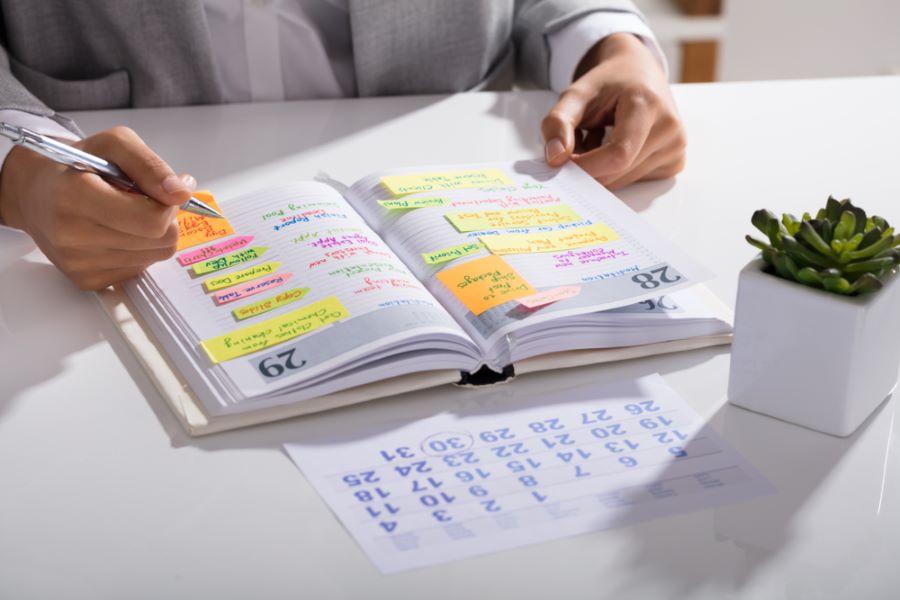
Have you attended weddings, birthday parties, and other celebrations and wondered, what goes into planning and executing these events? A successful event is a fusion of many aspects, including finding the right venue, caterer, decorations, and suppliers. But it takes a meticulous and dynamic event planner to bring everything together.
If you think you can thrive in this field, let’s explore essential steps on how to become an event planner in the Philippines. We’ll also discuss the specific duties of an event planner, as well as the skills you need to become an effective one.
What Do Event Planners Do?
An event planner, also called an event coordinator or event specialist, is an individual responsible for organizing all aspects of an event. People hire event planners to ensure that their event goes smoothly from start to finish.
A dependable and experienced event coordinator should be able to handle events of all types and sizes from corporate gatherings and anniversaries to concerts and product launches. So, what does an event coordinator do? No matter what the occasion is, event planners should know how to perform the following duties:
- Communicate with clients to understand their vision and bring it to life
- Plan and manage logistics, including cost, time, location, catering, and entertainment
- Negotiate and manage vendor contracts
- Coordinate with onsite staff and oversee all aspects of the event
- Make sure the client and guests are satisfied
- Track event expenses and ensure payment
With all these responsibilities, event planning is one of the most challenging but personally rewarding and lucrative careers in hospitality management. The average salary ranges from Php 23,000 to Php 40,000, but could increase depending on the type of event or level of experience.

What Skills Are Needed to Be an Event Planner?
A great event requires plenty of time, dedication, and hard work. Preparations don’t just happen overnight.
For aspiring event planners such as yourself, these are skills to have in the future to help you become more marketable and resilient in an ever-changing work environment:
Organization Skills
Perhaps this is the most obvious skill one should have. Event planners need to manage multiple tasks and timelines simultaneously. Strong organizational skills ensure that event planners can keep track of everything without buckling under pressure.
Attention to Detail
From seating arrangements to budgeting, events involve several aspects. If you’re not attentive to every detail, it’s only a matter of time before mistakes happen which can snowball into even bigger problems. This could spell disaster for the event’s success.
Problem-Solving
There are instances when problems and unexpected circumstances arise. What matters is you’re able to bounce back and rectify the situation promptly. Event planners must be quick on their feet and come up with creative and efficient solutions on the spot to keep things running smoothly.
Flexibility
Event planners have to be flexible enough to adapt to whatever happens before, during, and after the event. Events can be unpredictable and plans may need to change at a moment’s notice. Gown emergency? Missing or late maid of honor? An event coordinator should be resourceful and dynamic.
Time and Task Management
Events have strict deadlines, and timelines can be tight. With so much to do, it’s easy to get sidetracked by any last-minute changes. Event planners must effectively manage their time to prioritize tasks and follow schedules on the dot. Ideally, all tasks shouldn’t be assigned to just one person. You should enlist the help of your team or other vendors.
Interpersonal Skills
Event planners often speak with clients, vendors, sponsors, attendees, and guests. The success of an event depends on how well you can connect with these stakeholders and secure the best deals. Strong negotiation skills come hand in hand with interpersonal skills because you need to be likable and approachable to build relationships and get the best value out of the budget.
Creativity
Clients expect unique and unforgettable events. As an event planner, you need to think out of the box and come up with themes, designs, and experiences that will leave a lasting impression. Each event you organize should be one-of-a-kind so that you can have a more diverse and impressive portfolio.

How to Get Into Event Planning?
After pandemic restrictions were lifted, the industry saw a resurgence of in-person events. It’s no surprise that many individuals want to try their luck and test their abilities as an event planner. Considering the nature of the job, it may take years for you to be experienced enough for this position. However, there are plenty of ways you can get your foot in the door.
Here are 7 steps on how to become an event coordinator:
1. Get a Degree in Hospitality Management
Although not required, a degree in hospitality management or a related field can give you a big boost. A Bachelor of Science in Hospitality Management curriculum helps students become equipped with event management skills that they need in pursuing a career in event planning. A bachelor’s degree also gives you an advantage to negotiate a higher salary.
2. Gain Work Experience
Prospective event planners can start out in an entry-level position in a related field. You can plan events for free for friends and family or volunteer for local events to hone your skills. Once you feel confident enough in your abilities, you can try applying for other event planning companies and taking on bigger events. Everybody has to start somewhere.
3. Research the Industry
Doing your due diligence cannot be overstated. Understand what’s happening in the industry by conducting research. Who are the most influential and successful event planners? What is trending for specific event types? What are the best practices to follow?
Your research will serve as valuable information while you navigate through the industry. For example, understanding popular event themes and emerging technology like virtual event tools helps you position yourself competitively.
4. Build a Network
The best way to kickstart your career in events is to network. Events are all about who you know and who knows you. Word of mouth is a great tool to spread awareness about your services. Put yourself out there by attending conferences and conventions. Joining professional organizations also helps new event planners establish connections and increase job opportunities. You can also encourage loved ones to give referrals.
5. Choose a Specialization
Event planners can steadily build their portfolio by specializing in a certain type of event. By focusing on one niche, you can establish credibility and trust. You can eventually branch out and expand your services when the time and resources are right.
Generally, event planners are divided into three categories:
- Corporate event planners: These coordinators focus on organizing events for businesses and organizations. Corporate events include conferences, seminars, product launches, trade shows, and meetings.
- Social event planners: This category is the most familiar to clients. Social events are personal and social gatherings such as weddings, birthdays, anniversaries, family reunions, etc. If you’re learning the ropes of how to be an event planner, this is a good place to start.
- Nonprofit event planners: Nonprofit event planners work with charitable organizations, foundations, and NGOs. They handle B2C events such as conferences, galas, award ceremonies, outreach programs, and fundraisers.

6. Obtain Necessary Licenses and Certifications
If you plan on setting up a sole proprietorship, you must register and seek permits from the Department of Trade and Industry (DTI). On the other hand, partnerships and corporations must register at the Securities and Exchange Commission (SEC).
You may also need to obtain certifications, licenses, and permits from local authorities and regulatory bodies. These include the Events Management Services NC III qualification from the Technical Education and Skills Development Authority (TESDA) which certifies that you have the competencies to coordinate events, functions, and/or conferences.
You can also get a certificate in MICE professional event management, which is a program that equips participants with the event coordinators skills needed to successfully execute meetings, incentives, conferences, and exhibitions (MICE).
Event planners specializing in weddings can also apply for membership with the Philippine Association of Wedding Planners (PAWP). This organization consists of qualified wedding planners who pledge to uphold high standards in the business of wedding planning.
7. Market Your Services
Whether you’re an independent event planner or an owner of an event planning business, you’ll need to promote your services. Create a professional online presence by making a website or social media accounts that showcase your services, portfolio, and contact information. Most clients search for event inspirations and expertise online, so leveraging digital platforms can help advertise your marketability.
Kickstart Your Event Planning Career
There is no shortcut to success, but the journey can become smoother when you follow these steps to starting a career in event planning. You are well on your way toward creating one-of-a-kind, memorable, and hassle-free events that your clients will love!
But as with any career, having a solid educational foundation is crucial. OEd offers flexible online education for aspiring event planners who need a degree in hospitality management. With this competitive edge, you can explore more promising career opportunities and greater professional growth in the future.
Contact us for more information about our academic programs.
